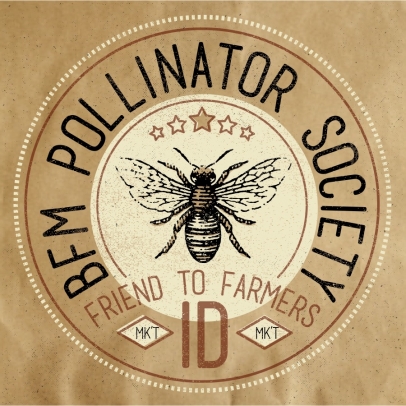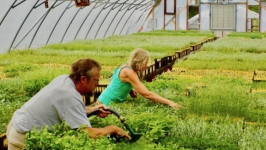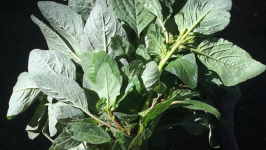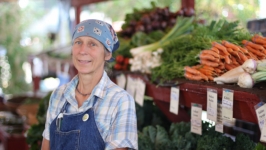Pollinator Patrons
Close your eyes and picture two scenes in quick succession: First, conjure up a field of bright flowers humming with bees and butterflies. They tumble from blossom to blossom, spreading pollen that will provide the next season’s blooms. Next, bring to mind a busy farmers market. People flit from booth to booth, loading up on jewel-colored produce. At every stop, money changes hands, ensuring that the next generation of farmers will have the funds they need to keep working their land.
If the two pictures seem oddly similar, you’ve successfully entered the mind of Dave Krick, the Boise restaurateur who, when the idea was tossed out at a Boise Farmers Market board meeting, saw the genius in connecting the dots between nature’s pollinators and farmers market supporters. Out of that meeting came a BFM innovation: a network of generous, environmentally and socially conscious citizens it’s calling the BFM Pollinator Society.
“I just clicked, and it’s authentic, because obviously a big part of what makes food work is pollinators, and pollinators are at risk,” Krick says, adding reverently, “Pollinators are everything.”
Krick, a BFM board member and the owner of Boise restaurants Bittercreek Alehouse, Red Feather Lounge and Diablo & Sons, is a selfproclaimed “background activist” working to generate ideas and connections on behalf of local farmers. The idea for the Pollinator Society was inspired by the partnerships between established farmers markets across the country, which are often 501c6 organizations (business leagues), and sister 501c3 organizations (traditional nonprofits) that handle their tax-deductible fundraising.
A prime example is the partnership between the Santa Fe Farmers Market and the nonprofit Santa Fe Farmers Market Institute, which was formed specifically to fund the market’s year-round venue and outreach programs, and to advocate for vendors. The BFM board agreed that forming a similar partnership in Boise with an existing nonprofit that shared its mission, the Treasure Valley Food Coalition, would be a smart move for the market’s stability, its longevity and the financial security of its vendors. Before the Pollinator Society was announced and began soliciting donations on September 7, BFM was operating without a financial safety net in place. However, its recent expansion and ambitious future goals made the innovation a necessity.
As BFM Market Manager Tamara Cameron explains it, “Bigger goals require bigger dollars. We have tons of ideas around making the farmers market an even better asset for the Treasure Valley. The Pollinator Society is going to be a key aspect of that.”
Members of the Pollinator Society are organized into pollinatorrelated groups according to the size and type of their donation to the market. For example, local businesses that donate over $1,000 annually are considered Hive Queens, while individuals who donate $50–249 per year are Carpenter Bees. Contributions can be one-time, annual or monthly, and every “pollinator” is rewarded with a perk from the market, whether it’s a pollinator seed pack, a Pollinator Society canvas bag or a framed sponsor poster. BFM also lists the donors on its website.
“It is an ongoing annual campaign that we will relaunch each year, and a fun way for individuals and businesses to get involved in the Boise Farmers Market,” says Cameron.
Sevana Saroyan, co-owner of SEVZ Kitchen, spearheads the committee that put the Pollinator Society together. She serves as vice president of BFM’s board of directors in addition to selling her hummus at the market each week, and has been working to educate her fellow vendors about the program and rally support for its goals. So far, she says she’s been surprised by their eagerness to get involved.
“I think it’s a great idea. I think this is going to take things to a whole new level—create a community, if you will,” she says, adding that the program seems to have given the vendors a renewed sense of belonging to the market.
In addition to stabilizing the market’s location and providing its farmers peace of mind, contributions to the Pollinator Society will fund community outreach to strengthen the local food scene and educational programs like the Sprouts Kids club, which Cameron says will offer activities focused specifically on pollinators. Adults, meanwhile, will be able to pick up free seed packets and learn how to plant pollinator gardens starting next season.
It’s important to note, though, that there is a dire side to the parallel between the Pollinator Society and real-life pollinators. As Krick points out, bees and butterflies are disappearing in tandem with America’s agricultural land and small farmers, a trend that spells disaster for the food system.
“It’s an important metaphor,” he says—perhaps one of the decade’s biggest understatements.
Boise Farmers Market | @boisefarmersmarket
BFM Pollinator Society
Bittercreek Alehouse | @bittercreekalehouse
Red Feather Lounge | @redfeatherlounge
Diablo & Sons | @diabloandsonssaloon
Santa Fe Farmers Market | @santafefarmersmarket
Santa Fe Farmers Market Institute
Treasure Valley Food Coalition | @treasurevalleyfoodcoalition
SEVZ Kitchen | @sevzkitchen







